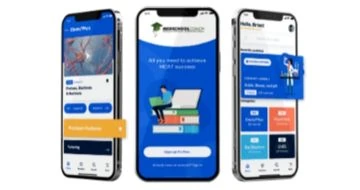Language Development
MCAT Psychology - Chapter 2- Section 5 - Cognition - Language
- Home
- »
- MCAT Masterclass
- »
- Psychological, Social, and Biological Foundations of Behavior
- »
- Psychology
- »
- Cognition
- »
- Language
- »
- Language Development – MCAT Psychology
Sample MCAT Question - Language Development
Words one can understand are generally described as one’s:
a) Productive vocabulary.
b) Receptive vocabulary.
c) Comprehensive vocabulary.
d) Written vocabulary.
B is correct.
Receptive vocabulary comprises the words one can understand. A is incorrect. Productive vocabulary comprises the words one can actively and correctly produce/speak. C is incorrect. Comprehensive vocabulary comprises all the words one is able to understand and produce. D is incorrect. Written vocabulary comprises all the words one can write, not just understand.
Conciousness-Altering Drugs
Get 1-on-1 MCAT Tutoring From a Specialist
With MCAT tutoring from MedSchoolCoach, we are committed to help you prepare, excel, and optimize your ideal score on the MCAT exam.
For each student we work with, we learn about their learning style, content knowledge, and goals. We match them with the most suitable tutor and conduct online sessions that make them feel as if they are in the classroom. Each session is recorded, plus with access to whiteboard notes. We focus on high-yield topics if you’re pressed for time. If you have more time or high-score goals, we meticulously cover the entire MCAT syllabus.
Language Development for the MCAT
When infants are born, they are incapable of producing speech. They can make sounds and cry, but they cannot produce speech. At the age of six to nine months, infants begin to produce pre-speech sounds, called babbling, and from ages nine to 18 months, infants begin to learn words and build their vocabulary. In this post, we’re going to go over several key concepts related to language development that you need to know for the MCAT.
Naming Explosion/Word Spurt
The rate at which children learn words is not linear. Initially, young children learn words slowly at a rate of approximately 10 words per month. But once they have learned approximately 50 words, they experience what is called a naming explosion. This is also known as a word spurt or a vocabulary spurt. These terms describe the stage in which children begin to learn words at a much higher rate, usually at around 30 words per month.
Fast Mapping
The process by which children learn new words after single exposure is called fast mapping. However, this process often leads children to make common errors, including overextension, underextension, and telegraphic speech.
Overextension
Overextension is when a child incorrectly uses a word beyond the scope of its meaning. An example would be a child that learns that their pet dog is called a “dog.” Then, when they go outside, they see a furry animal, like a cat, and they call the cat a “dog.” This is overextension.
Underextension
Underextension is the opposite. This is when a child incorrectly restricts the use of a word. For example, say again that a child learns that their pet dog is called a “dog,” so they call their pet a “dog.” However, when the child goes outside and sees other dogs, they don’t call those dogs “dogs.” This is underextension.
Telegraphic Speech
Finally, we have telegraphic speech. This is condensed speech that typically only contains the central components of the speech (the nouns and the verbs) and excludes the connective parts of speech. An example would be a child saying, “give toy,” as opposed to the complete speech: “Please give me the toy.”
Explore More MCAT Masterclass Chapters
Take a closer look at our entire MCAT Masterclass or explore our Biochemistry lessons below.

One-on-One Tutoring
Are you ready to take your MCAT performance to a whole new level? Work with our 99th-percentile MCAT tutors to boost your score by 12 points or more!
See if MCAT Tutoring can help me
Talk to our enrollment team about MCAT Tutoring

MCAT Go Audio Course
Engaging audio learning to take your MCAT learning on the go, any time, any where. You'll be on the way to a higher MCAT score no matter where you are. Listen to over 200+ lessons.

MCAT Practice Exams
Practice makes perfect! Our mock exams coupled with thorough explanations and in-depth analytics help students understand exactly where they stand.

MCAT Prep App
Access hundreds of MCAT videos to help you study and raise your exam score. Augment your learning with expert-created flashcards and a question banks.